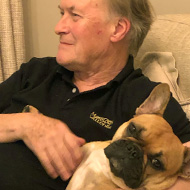Westminster dog award dedicated to Sir David Amess

Pictured: Sir David Amess with Vivienne.
An award dedicated to the late MP Sir David Amess has been introduced to the Westminster Dog of the Year competition.
Sir David, who suffered a tragic death in October 2021, was known to be passionate about dog welfare and greatly enjoyed the Westminster Dog of the Year competition, entering several times with his rescue dogs, Bo and Lilly.
Entering with his dog Vivienne before his death, Sir David was posthumously crowned winner of the 2021 competition, and the competition now wishes to commemorate his legacy of commitment to dog welfare.
At this year's event, hopeful MPs will have the chance to win the Sir David Amess Pawblic Vote Award, presented to an MP and their dog voted for by the public.
Commenting on the accolade, Sir David's family said: “As a lifelong campaigner for animal rights, we can think of no better recognition of his work than through the renamed ‘Sir David Amess Pawblic Vote Award’.
“He worked tirelessly throughout his career with organisations such as The Kennel Club and Dogs Trust to secure better animal welfare for the nation’s furry friends.
“We are honoured that The Kennel Club and Dogs Trust have re-named the award after him and he would be thrilled that there is such a wonderful recognition as a lasting memory for him.
“We would like to thank both organisations for their support and kindness, and we hope that this year’s winner is ready for the ‘pawblicity’ that will no doubt follow from winning such a prestigious award. Best of luck to all the entrants.”
Chief executive of Dogs Trust, Owen Sharp, added: “Sir David was a steadfast supporter of both the work of Dogs Trust and of the Westminster Dog of the Year award, an event which he entered a number of times, with both Dogs Trust dogs and with his own dogs.
“Sir David’s commitment to improving the lives of dogs and other animals is admirable and we hope that this award will continue to cement his legacy.”



 The RCVS has announced a new version of its 1CPD mobile app, with enhanced features for veterinary surgeons and veterinary nurses to record their continuing professional development.
The RCVS has announced a new version of its 1CPD mobile app, with enhanced features for veterinary surgeons and veterinary nurses to record their continuing professional development.